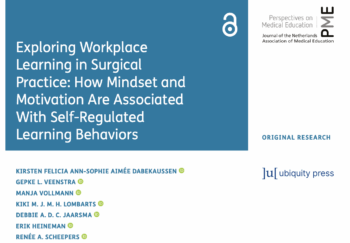Hello, I'm
Kiki Lombarts
professor professional performance AMC

An introduction
The common thread through my working life can be summarized as 'doctors and quality'. Or more specifically, the quality of (the functioning of) medical specialists. For more than 30 years I have been researching, following, advising and guiding them. I talk with and about doctors, watch them and sometimes keep an eye on them. It keeps me fascinated.
On this website I tell you more about it and you can read what it has yielded (my performance), what occupies me now (my news ) and what I am working on (my agenda)..

Nieuwtjes...
 Continuing to perform well means engaging in lifelong learning. For surgeons, this is crucial for the timely recognition and reduction of patient safety risks. Research on learning in practice often adopts the lens of self-regulated learning (SRL), which consists of a cyclical model of preparation (setting goals, planning, choosing an approach), execution, and reflection. Self-regulated learning has been shown to be more effective for individuals with a growth mindset: those who believe that abilities and intelligence can be developed through effort. In contrast are those who are convinced that abilities and capacities are innate and therefore unchangeable: the fixed-mindset individuals. To add a necessary nuance: mindset is, of course, not a dichotomous phenomenon, and it also appears to be context-dependent. Still, research has shown that a growth mindset enhances both learning capacity and motivation. As everyone knows from experience, motivation is key when it comes to learning, with intrinsic motivation resulting in the best possible performance.
Continuing to perform well means engaging in lifelong learning. For surgeons, this is crucial for the timely recognition and reduction of patient safety risks. Research on learning in practice often adopts the lens of self-regulated learning (SRL), which consists of a cyclical model of preparation (setting goals, planning, choosing an approach), execution, and reflection. Self-regulated learning has been shown to be more effective for individuals with a growth mindset: those who believe that abilities and intelligence can be developed through effort. In contrast are those who are convinced that abilities and capacities are innate and therefore unchangeable: the fixed-mindset individuals. To add a necessary nuance: mindset is, of course, not a dichotomous phenomenon, and it also appears to be context-dependent. Still, research has shown that a growth mindset enhances both learning capacity and motivation. As everyone knows from experience, motivation is key when it comes to learning, with intrinsic motivation resulting in the best possible performance.
Okay, so SRL, mindset, and motivation are interrelated. In this study by Kirsten Dabekaussen et al., we set out to disentangle these relationships. More specifically, our question was what role motivation plays in the relationship between mindset and SRL. What we found is that surgeons with a strong growth mindset more frequently went through all three phases of SRL. We also found that SRL was not directly affected by a fixed mindset, but rather indirectly through lower levels of intrinsic motivation. The figure summarizes the results. These can, of course, be explored in detail in the publication in Perspectives on Medical Education.
 Today, the LNVH presented the Monitor of Women Professors 2025 in the auditorium of TU Delft. Chair Prof. Yvonne Benschop outlined the main figures and symbolically presented the first copy to the university’s Vice-Rector, Prof. Hans Hellendoorn (see photo).
Today, the LNVH presented the Monitor of Women Professors 2025 in the auditorium of TU Delft. Chair Prof. Yvonne Benschop outlined the main figures and symbolically presented the first copy to the university’s Vice-Rector, Prof. Hans Hellendoorn (see photo).